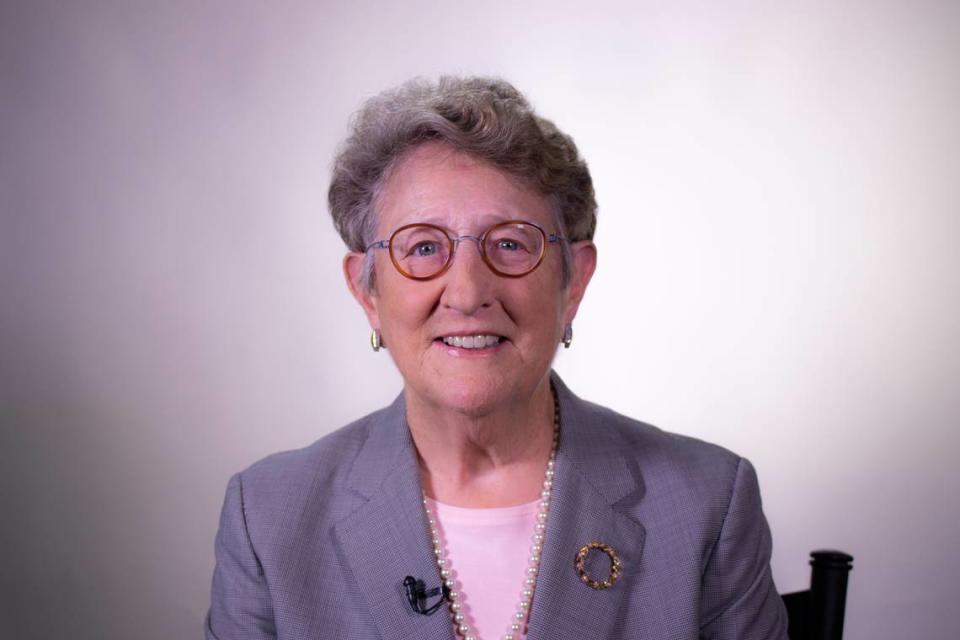Who is Jean Toal, the former SC Supreme Court justice now taking over Murdaugh case?
- Oops!Something went wrong.Please try again later.
The newest judge tasked with overseeing the murder case against disgraced Lowcountry attorney Alex Murdaugh is no stranger to the spotlight.
Judge Jean Toal, a former S.C. Supreme Court chief justice, was handed the case Tuesday, taking over from Judge Clifton Newman, who is retiring from the bench after overseeing Murdaugh’s double murder trial earlier this year.
Toal, 80, is still a serving South Carolina judge almost a decade after she stepped down from the state Supreme Court. From 2000 to 2015, Toal served as the state’s first female chief justice, as well as the first Roman Catholic and native Columbian to preside over South Carolina’s highest court, according to her alma mater, the University of South Carolina Law School.
“She’s perfect for the job,” said longtime friend, lawyer and former Columbia Mayor Bob Coble. “She’s got trial experience and appellate experience..”
Now retired, Toal’s official status is “active retired” and she was recently deemed qualified to serve in that status by the state Judicial Merit Selection Commission. Judges in that status serve at the pleasure of the State Supreme Court chief justice, who is Don Beatty. Beatty named Toal to the Murdaugh case on Tuesday afternoon.
Toal grew up in Columbia and graduated from Dreher High School in 1961, where she developed a reputation as one of the state’s top debaters. She earned a bachelor’s degree in philosophy from Agnes Scott College in Decatur, Ga., in 1965 before she earned her J.D. in 1968 from USC, where she edited the South Carolina Law Review.
She practiced law in the Palmetto State for 20 years, first with the Haynsworth Law Firm in Greenville and later as an associate and partner with the firm Belser, Baker, Barwick, Ravenel, Toal & Bender in Columbia. From 1975 until her election to the Supreme Court in 1988, Toal served in the S.C. House of Representatives as a Democrat representing Richland County.
From a perch on the Judiciary Committee of the S.C. House of Representatives, Toal managed a rare leap directly from the Legislature to the Supreme Court without going through the intermediate step or steps of first being a trial or lower appellate court judge.
Toal was considered a trailblazer for women in the law in South Carolina, going so far as to argue before the U.S. Supreme Court to press the land claims of South Carolina’s Catawba Indian Nation. As a legislator, Toal chaired the House Rules Committee and pushed for the adoption of the Equal Rights Amendment to the U.S. Constitution. She also fought for reforms in the S.C. Freedom of Information Act to make government more open.
Toal was chosen three times by S.C. lawmakers to serve as chief justice for full or partial terms, until her last stint in the office was ended when she hit the mandatory retirement age of 72. Her time on the bench was noteworthy for digitizing and automating South Carolina’s case management system across courthouses in all 46 counties, according to her biography on the state’s judicial department website.
By the time she retired from the high court, Toal had achieved a reputation as “a game-changer in multiple arenas, pulling off the high-wire act of being a successful revolutionary for civil rights and women’s and other causes while inhabiting the conservative, hidebound and sometimes rarified world of South Carolina’s political and legal classes,” a 2015 article in The State newspaper noted.
Toal was also the subject of a collection of 23 essays by the University of South Carolina press called “Madame Chief Justice.” The essays, written by former law clerks and others who knew her, closed with an essay jointly written by South Carolina historian Walter Edgar and U.S. Judge Joe Anderson, who wrote, “Championing a cause – be it civil rights, women in the law, or court reform — is one thing. Making a difference, making changes happen, is quite another.”
She was also friends with two trail-blazing justices on the U.S. Supreme Court — the late Ruth Bader Ginsburg and Sandra Day O’Connor.
Since her retirement from the high court, Toal has continued to hear cases in an “active retired” capacity, including overseeing the fallout from the collapse of a nuclear construction project in Fairfield County. A joint venture between the now-defunct SCANA Corp. of Columbia and the state-owned Santee Cooper utility, the project collapsed in 2017 because of cost overruns and missed deadlines. In 2020, Toal signed off on Santee Cooper’s $520 million settlement with ratepayers.
Toal has also overseen asbestos-related litigation in the state as a retired justice.
While Murdaugh was convicted in March of killing his wife and son on the family’s rural Colleton County property, his high-profile case has remained in the news. Murdaugh’s attorneys are seeking to have his conviction and life sentence overturned due to claims of jury tampering by Colleton County Clerk of Court Becky Hill, potentially giving Toal plenty to do in the new year.


